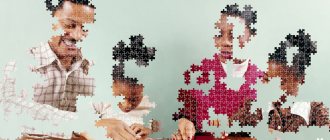Psychological traumas of childhood occur in almost every person, but for the development of some people they do not have a strong influence, while for others they are a factor in disorders of all aspects of the psyche. The depth of trauma depends on the individual psychological characteristics of the person, the frequency and duration of exposure to negative factors and the type of traumatic event.
It is best to correct serious psychological traumas with a specialist immediately after their occurrence or at the first opportunity, even if ten years have passed. Unprocessed psychological traumas leave unpleasant imprints on the psyche, behavior and state of a person: from shyness and depression to aggressiveness and destructive behavior.
Causes of childhood psychotrauma
The cause of childhood psychological trauma can be any event that has high significance in the eyes of the child. Sometimes it doesn’t even occur to adults that they are causing such trauma to the baby, but he feels in a very traumatized state. But the most common causes and factors in the formation of childhood psychotraumas can be divided into several groups:
- Diseases. This can be either a serious illness with long treatment, or constant colds that limit the child’s joy of childhood. He feels helpless, weak, and worries that his unpleasant condition will last forever. Having matured and overcome the disease, a person often becomes overly attentive to his health, constantly looks for some symptoms, undergoes examinations and begins to worry that an ordinary runny nose can develop into something more serious.
- Violent actions by adults. Often parents, trying to “raise a real person” and wanting the “best” for their child, constantly put pressure on him, using methods of psychological and physical violence: shouting, ignoring, physical punishment. Sexual violence can be highlighted as a separate line, the consequences of which can only be dealt with by specialists with psychotherapeutic education. As a result of violent actions, a child develops fear, self-doubt, low self-esteem or aggressiveness and hatred of the whole world.
- Betrayal by adults. Divorce of parents, injustice towards the baby and towards each other are the most common reasons from this group. A person develops a feeling of guilt and difficulties in relationships with society.
- Absence or serious lack of parental attention to the child. If in early childhood he does not receive love, affection, acceptance, care and tactile contact, then in adulthood he will have difficulty showing such actions towards other people, which will complicate his interaction with people, especially with the opposite sex and his own children.
- Death of a relative. Such an event turns the child’s life upside down, as a result of which he withdraws, stops communicating, and changes his worldview. Here the consequences can be very different. It will be better if the child copes with them under the supervision of a psychotherapist.
- Parental dependence. A child left to his own devices and constantly feeling responsible for adults rarely grows up to be a psychologically healthy person.
How do children express their emotions?
Children's reactions vary depending on their evolutionary age and the emotional significance of the event, violence or loss. Children usually have difficulty verbalizing their emotions. Emotions are usually expressed through worry, agitation, rage, anger, fear, trouble sleeping, nightmares, etc. They may also report physical symptoms such as headaches or stomach problems, etc. When children cry or become sad for no reason, it may mean that they are struggling with pain and need help.
Types of psychotrauma
All psychological trauma in childhood can be divided into 5 groups:
- The trauma of rejection. This type includes betrayal, ignoring, expulsion, and jealousy of parents towards their siblings.
- The trauma of a relationship breakup. This includes serious conflicts, quarrels, phrases from parents like “you are no longer my daughter,” “I don’t want to see you,” “consider that I am dead for you.”
- Trauma of loss. These are the losses of close relatives to whom the child is attached.
- Health related injuries. A serious diagnosis in which adults are constantly worried, and the baby himself experiences various kinds of troubles associated with treatment: pain, fear, defenselessness and helplessness.
- Trauma of violence. From an early age, a feeling of injustice, a constant feeling of fear and helplessness, a lack of personal psychological and physical boundaries.
Not all psychological traumas encountered in a child’s life fall into these groups, but this classification is the most complete of the existing ones.
Life scenarios
The famous psychologist Eric Berne proposed the idea of “life scripts” that dictate our actions and our behavior in general.
This is an unconscious life plan that we borrowed from our parents, and which gives us the illusion of control over the situation and life.
Usually by the age of 7 this script has already been laid down, and in the future a person builds his life largely due to the influence of this unconscious script. When solving his life problems, a person is forced to solve the problems of his parents, his grandparents. You need to understand that this is not a detailed exact copy of the generic script, but a general direction and constant work on mistakes, your own and those of your ancestors.
This situation is aggravated in childhood by directive messages from parents to their child , when parents, out of “good intentions,” instill in their child guidelines on how to live.
A directive is a hidden order, implicitly formulated in the words or actions of a parent, for failure to comply with which the child will be punished.
Not explicitly (with a spanking or a slap on the head, silent blackmail or scolding), but indirectly - with one’s own sense of guilt before the parent who gave this directive. Moreover, the child cannot understand the true reasons for his guilt without outside help. After all, it is by following directives that he feels “good and correct.”
Symptoms of psychological trauma
Each child experiences psychological trauma from childhood individually, but all signs can be divided into two large groups: psychological and physiological.
Psychological symptoms
These are sharp and sudden changes in the child’s behavior and emotional state that appear after a traumatic event.
- sudden mood swings;
- guilt. Children express it with the words: “it’s because of me,” “if it weren’t for me, this wouldn’t have happened”;
- anxiety. It can be noticed by its behavior: the baby hides his eyes, tries to be invisible, constantly fiddling with something in his hands, and performs obsessive actions;
- feeling abandoned. Manifests itself in the phrases “no one loves me”, “I am left alone”, “no one can help me”;
- confusion and impaired concentration. The child cannot concentrate on the actions being performed and is constantly distracted by his thoughts;
- isolation. The child does not want to talk even with those with whom he previously enjoyed communicating, does not rejoice at the arrival of friends, and does not engage in communication with familiar peers.
Physiological symptoms
These are changes in behavior. Concerning physiological processes.
- sleep disorders. The child has trouble falling asleep, wakes up at night, suffers from nightmares;
- cardiopalmus
- increased fatigue and decreased performance;
- muscle tension;
- fussiness in behavior.
If you have several signs at the same time, you should contact a psychologist for advice and diagnosis of the baby’s condition.
When we feel powerless
Many of us watched the film “White Bim Black Ear” as children. It is constructed in such a way that while watching the film you become attached to the image of this dog. Then, when a tragedy happens to the dog, you really want to change something, but you absolutely can’t, because it’s a movie.
However, this does not matter for your psyche. Feelings are feelings. And at this moment you experience the most terrible powerlessness . Trauma will not happen if an adult or friend helps you cope with your feelings, or if you fantasize about a different ending or how to deal with the authors of such a movie.
Consequences of psychological trauma
Psychological traumas that arose in childhood and were not worked through with a specialist lead to serious consequences, some of which are quite unexpected.
- Adult abuse often leads to eating disorders, including obesity, bulimia and anorexia. This is due to the fact that a person tries to enjoy food from childhood, but is often not ready to accept his body, which changes in size. The more he worries about his body, the more he eats. Only specialists can break this vicious circle.
- Parents with addiction are raising a psychologically traumatized child who tries to keep everything under control, has a hard time getting used to new conditions and people, is afraid to make mistakes, relax and just have fun. This usually happens when a child, from early childhood, has to take on the non-childish functions of adults in everyday life.
- Emotional abuse. The child cannot protect himself from caustic statements, is afraid to express his opinion and thoughts, and feels constant anxiety before saying something. Such a child grows into a corresponding adult: shy of his own opinion, with the fear of being rejected due to a minor mistake in statements.
- Abuse and physical violence. Having learned from childhood to please others for the sake of their own safety, a person in adulthood does not know how to refuse, is easily manipulated and does not know how to set psychological boundaries.
- Lack of choice. If from a young age a child did not have the opportunity to choose, and was constantly subjected to criticism of his desires and pressure from adults with the words “I want what is best,” then, having become an adult, he is no longer ready to make this choice. He often gives in to any persuasion, even if it goes against his own views, plans, needs and desires.
- Parents' divorce. Children in most cases feel guilty about this event. As a result, when they become adults, they place excessive demands on themselves and on their future partner, which sometimes causes difficulties in finding their own spouse.
Fantasies and thoughts of children.
Regardless of direct participation in the event, children are aware and feel when something serious is happening. If you are silent or vague about an event, you are leaving your child alone with his thoughts, his imagination, his unanswered questions, and all the uncertainty that creates. If the information is not provided, we leave the child to his fantasies, which are usually worse than reality.
Negative fantasies can cause feelings of anxiety and horror, which subsequently manifest themselves as physical or mental vulnerability.
Children who have experienced traumatic events may face many problems in the future. They can range from a short spontaneous reaction expressed as stress to a more complex syndrome defined as complex post-traumatic disorder.
Stages of experiencing psychotrauma
There are 5 stages of children experiencing psychological trauma:
- Negation. The child is in shock, he is not ready to accept what is happening to him at the moment, so his psyche is trying to defend itself. For example, a baby refuses to believe that his mother does not want to notice him because of some kind of misconduct.
- Anger. The baby sees that what happened is quite real. He disagrees, gets angry and angry, and can even destroy and break everything around him. If the situation does not change and the mother continues to ignore him, then after an emotional outburst there is a transition to the next stage.
- Bargain. The kid is trying to come to an agreement: “Mom, I’ll be good,” “Mom, please talk to me, and I’ll fix everything.” If the mother remains adamant, the child begins to truly grieve.
- Grief. The baby cries and sobs, realizing that the old relationship cannot be returned.
- Adoption. The baby learns to live with the fact that the relationship with his mother has changed and will no longer be the same.
Of course, in the example presented, the situation is a little exaggerated, and the injury caused by ignoring is not caused at once, but through periodic repetition. But with any injury, the child goes through these stages. The more serious the injury, the longer the stages extend over time.
We experience helplessness
Here is a girl who lost her new expensive doll in the yard. The mother told her daughter: “Go outside, look, and if you don’t find it, you don’t have to come home!”
The girl searched the entire yard. The doll is not found. She already feels powerless, but still makes some attempts to find the doll. And suddenly a neighbor comes up to her and says: “Bunny, why are you crying? What's happened?".
Can you imagine how much easier it becomes for the girl at this moment? Because the help of another person was added to the situation.
If no one appears by the time the girl stops looking for the doll and sits on a bench to simply wait for her terrible fate (to remain living on the street), then this will be traumatic. Even if the mother comes out and takes the girl home and everything seems to be fine, the horror that is imprinted on the child’s body and psyche will remain forever. She will always carry this experience with her.
What are the dangers of childhood psychological trauma?
Any injuries, regardless of type, have a serious negative impact on the process of children's socialization. The child has difficulties making friends, communicating with new people, adapting to new conditions and teams. In a child with psychological trauma, the psyche is prone to the formation of obsessions, fears and social phobia.
The consequences of childhood psychological trauma in adults manifest themselves in a high risk of developing depression, in which a huge sense of guilt can destroy all aspects of their lives.
Childhood traumas in adulthood, according to psychology, due to the stress experienced, develop into obsessive-compulsive disorders, characterized by the performance of strange defensive actions under the influence of illogical obsession.
How parents can help their child
The main thing that parents can do to help a child if he has psychological trauma is to change the strategy of his educational influences to a more benevolent one. To do this, you yourself need to come to a sufficiently high level of psychological and pedagogical knowledge. The main task is to create a comfortable environment for the baby in which he can fully develop and socialize without experiencing anxiety and fear.
To be confident in the correctness of your actions, as well as for more specialized help on how to overcome childhood psychological trauma, you need to contact a psychologist or psychotherapist.
Methods of psychological assistance to a child with psychotrauma
How to get rid of childhood psychological traumas? In most cases, the child is helped by the following methods of psychological work:
- Different types of art therapy. In drawings, fairy tales, and modeling, the child is freed from negative emotions, expresses his feelings, and has the opportunity to look at the situation from different angles.
- Sand therapy. Allows you to relax, put yourself in the shoes of other participants in events, and play out various options for resolving a particular situation.
- Group work. Suitable for children over 10 years old. The child, seeing that he was not the only one who had to endure traumatic situations, feels psychological support and becomes more self-confident.
- Behavioral therapy. Helps the child reinforce ways to prevent trauma in their behavior. For example, a child learns to resist bullies who use psychological violence.
- Cognitive therapy. Allows the child to learn to put cognitive processes above emotional ones, as a result of which he becomes less susceptible to psychological trauma.
You should not try to get rid of childhood psychological trauma on your own in the absence of the necessary psychological experience, as this can only aggravate the situation.
Not all severe events lead to injury.
What to do to heal trauma? First understand under what conditions it happens . After all, there are a million stresses and shock situations in our lives, but trauma does not always occur. Moreover, there are many really traumatic situations in life, but not all people come out of them broken. Why? There are three factors that must coincide for an injury to occur .
- Impotence.
- Helplessness.
- Loss of activity.
Let's look at a few examples.
Working with adults who have experienced childhood trauma
Adults often turn to a specialist with various symptoms, the cause of which, during deep psychotherapeutic work, turns out to be psychotrauma received in early childhood. In this case, it is also possible to work through them and, thanks to this, improve the quality of a person’s future life.
- Empty chair technique. The psychotherapist asks the patient to imagine that a significant person with whom traumatic events are associated is sitting on an empty chair opposite him. This way a person can express his emotions and feelings, thereby working with his own trauma. He is also invited to sit on this empty chair and be that person, answer his questions on his behalf, try to explain his behavior. This technique helps a person relive all the events, but under the control of a psychotherapist, who in time will be able to direct the course of the situation in a less traumatic direction.
- Schematic therapy. Using techniques such as dialogue, role-playing, journaling, and behavioral skills training, the therapist changes the person's self-perception, helps overcome fears, and corrects the patient's desire to avoid unpleasant situations.
- Eye movement desensitization and reprocessing. This is a special technique that helps get rid of the patient’s habitual reaction to psychological trauma. The essence of the method is that a person, observing with his eyes some moving objects, tries to focus on his internal sensations associated with the injury. At the same time, both hemispheres of the brain work simultaneously, as a result of which painful memories become less traumatic.
My tips
The main wish for parents is to protect the psyche of their child from early childhood. Try to build a behavioral strategy with him in which the baby will feel comfortable:
- feel loved and needed;
- not feel humiliated;
- not be subjected to psychological and physical violence;
- know that almost any problem can be solved together with loved ones.
It’s a good idea to teach your child to express his feelings: “I’m angry,” “I’m sad,” “I’m sad,” so that if a traumatic situation arises, he can express everything that he is experiencing. This will help get rid of excess stress.
It is also worth teaching your child safe ways to express negative emotions: scribbling on a sheet of paper, tearing paper, beating a pillow.
If you have questions about how to behave correctly in the event of psychological trauma in a child or about ways to prevent it, you can contact a psychologist, for example, who is on staff at the educational institution that the child or teenager attends.
How to deal with this?
You can only deal with trauma through acceptance. Through the idea that it will never go away, but you can treat it and learn to live with it.
It's like if you break your leg and your bone heals, there's always a trace. The more complex the fracture and the less professionally you were treated, the greater the likelihood of some consequences in the future. But no matter how small the fracture, no matter how good the doctors work with you, the mark will always be there.
And then you need to know more about your trauma than any psychotherapist knows, because it’s up to you to live with it. You need to study it, look at it closely and purely and accept it as part of yourself.
For example, knowing that you have self-esteem trauma , you should not ask people to criticize you, because this will always be painful for you. Or if you need criticism, then you need to know where you will go next to calm down and how you will blow on the wound.
If you have the trauma of early loss , you need to learn to notice how you push people away in advance, how you are the first to abandon everyone, because intimacy for you is the risk of a new loss. Notice how you argue with your husband if he goes out to sit with friends, because for you it resonates with that experience.
After physical violence and especially sexual violence, it is vitally important for you to constantly understand whether you want a hug at the moment, whether it is now possible for a person to touch you. You may think that your sex will only happen when you suggest it.
Advertising









